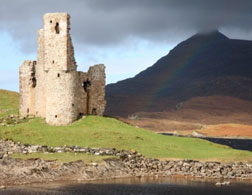Sex, Violence, and the Supernatural
Before the tabloids, there were the folk ballads.

The supermarket tabloids seem to have fallen on hard times. Much of their distinctive subject matter—unnatural violence, forbidden sexual activity, awful secrets, misbehavior by the eminent, supernatural horrors—has been taken over, increasingly, by digital media.
The anonymous English and Scottish folk ballads collected by the 19th-century scholar Francis James Child often have similar subjects. The misbehavior of lords and ladies and commoners in these poems resembles the crimes, embarrassments, and horrors of show-business eminences and ordinary wrongdoers in today's obsolescent tabloids. Sometimes, the ballads are impressive works of art, going far beyond the merely sensational. "The Cruel Mother," with its lurid, grisly tale of sex, violence, and the supernatural, exists in many versions. I think the one below is impressively horrible and deeply uncanny, effects that arise from its extreme economy: This poem uses fewer than 200 words (as the word processor counts) to tell the grim story with its eerie conclusion; but because of the refrain and the repetition of words like "sweet," "babe," and "smile," the poem's actual lexicon is approximately half of that—only about 100 different words!
The two refrain lines serve as fierce, heartbreaking commentary on the action as it unfolds. The word rarely denotes "unusually, splendidly" in a familiar modern sense, but in a different, older meaning, it also indicates "eagerly" or "avidly." (That second meaning survives in rare for meat taken eagerly from the cooking fire.) In this poem, the refrain suggests the avidity of the green leaves, the eagerness of sex, the craving of an infant for its life, the craving of the mother for hers—and, implicitly, the horribly if vaguely punitive society ("ye'll smile me dead") that menaces all of this natural "eagerness" with its craving for a merciless order.
The poem is, among other things, a remarkably effective (and repellent) ghost story. It is also—unlike any tabloid story I'm aware of—a powerful work of art.
"The Cruel Mother"
She sat down beside a thorn,
......Fine flowers in the valley,
And there she has her sweet babe born
......And the green leaves they grow rarely."Smile na sae sweet, my bonny babe,"
......Fine flowers in the valley,
"And ye smile sae sweet, ye'll smile me dead,"
......And the green leaves they grow rarely.She's taken out her little pen knife,
......Fine flowers in the valley,
And twinned the sweet babe o' its life,
......And the green leaves they grow rarely.She's hawket a grave by the light o' the moon,
......Fine flowers in the valley,
And there she's buried her sweet babe in
......And the green leaves they grow rarely.As she was going to the church,
......Fine flowers in the valley,
She saw a sweet babe in the porch
......And the green leaves they grow rarely."O sweet babe, and thou were mine,"
......Fine flowers in the valley,
"I wad clad thee in the silk so fine."
......And the green leaves they grow rarely."O Mother dear, when I was thine,"
......Fine flowers in the valley,
"You did na prove to me sae kind."
......And the green leaves they grow rarely.
Click the arrow on the audio player below to hear Robert Pinsky read "The Cruel Mother." You can also download the recording or subscribe to Slate's Poetry Podcast on iTunes.
Slate Poetry Editor Robert Pinsky will be joining in discussion of "The Cruel Mother" this week. Post your questions and comments on the poem, and he'll respond and participate. (In the interest of keeping the discussion as rich as possible, please read existing comments before posting your own.) You can also browse "Fray" discussions of previous classic poems.